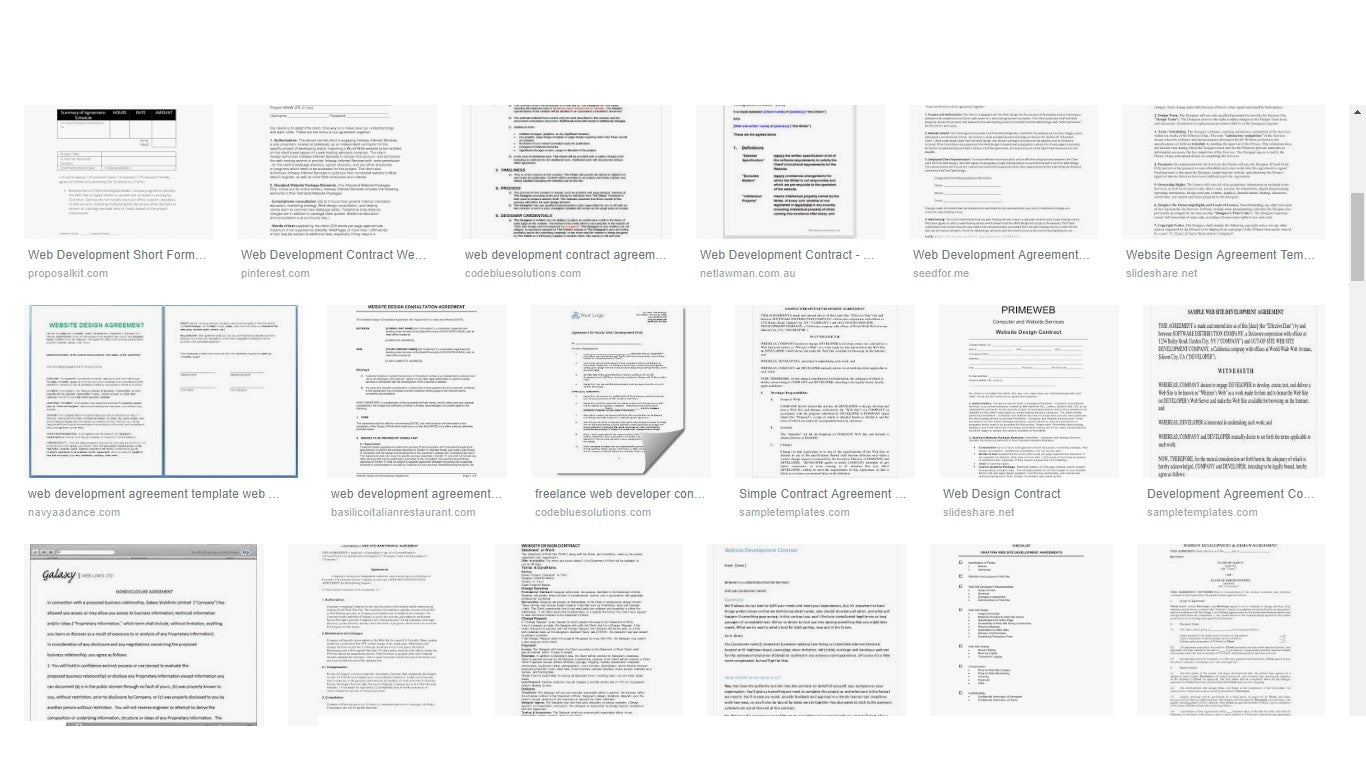As a business owner, you should always enter into written legal contracts with your clients. Contracts help ensure that everyone is on the same page and that the terms of the deal are cemented in writing that you can refer back to at anytime.
Yet, legal contracts often get pushed to the back burner because they can be expensive, boring, and confusing for a lot of people. As a result, many entrepreneurs go online, search for a contract, and use a template that they think looks and sounds good. Makes sense, right? It’s free, it looks legit, and apparently someone out there has used it before.
Sorry to rain on your parade, but this is not a great idea in the grand scheme of your business. In fact, using a contract for your business that you found online can do more harm than good. In this article, we look at five reasons why you should never use a business contract template that you found online.
1. You don’t know who drafted the contract
When you find a contract on Google, you likely don’t have information about who drafted the document. Is the author a lawyer or someone in your field? Do they have experience writing legal contracts? Do they know what they are talking about?
By using this contract, you are putting your faith in the notion that someone “out there” knew what they were doing when they put the template together. That’s not a risk I suggest taking with your business.
"Sorry to rain on your parade, but using a contract for your business that you found online can do more harm than good."
If you are not legally trained and neither is the author, how do you ensure that what you need is in the agreement? Does the author understand legal issues such as copyright ownership, limitation of liability, or termination? Are all of the required provisions written down in the agreement? In most industries, standard contractual documents do not exist. It’s a bit of a wild west scenario where anyone can put anything into their agreements.
However, just because anyone can draft a contract, doesn’t mean they should. For purposes of this article, I searched “web development contract” on Google. This is just a sample of the contracts that came up in the search:

How do you even begin to decide which contract to use? Unless you are a lawyer with expertise in contracts, there is just too much choice and too much risk to leave it to Google to find you a free template.
You might also like: How to Create Fast, Impressive Proposals That Sell.
2. It may not have been drafted for your business’s industry
As mentioned above, most industries do not have standard contracts. However, there are issues that are specific to certain industries that you want to ensure are covered in your agreements.
Take web design for example. In any web design contract, you need terms relating to who owns the copyright, the responsibilities specific to the project (i.e. will they provide photographs? If so, when?), whether the designer offers a 100 percent satisfaction guarantee, etc. These are all provisions specific to web design. If the contract you found online is not from that industry, it may be missing specific provisions that you need for your business.
This works both ways—the contract you found online may also have sections that apply to an entirely different industry, and don’t make much sense for you. The troubling part about all of this is that you don’t know what you don’t know. If you don’t know what needs to be in a web designer’s contract, you won’t know it’s missing from a template that you found online.
"If you don’t know what needs to be in a web designer’s contract, you won’t know it’s missing from a template that you found online."
3. You don’t know the jurisdiction
Often contracts will have a section stating that the contract is governed by the law of a certain jurisdiction. Laws differ by country, state/province, and even city. A contract written for one jurisdiction may not necessarily be appropriate for your jurisdiction.
For example, there are certain processes that are governed by local law. If there is potential legal action in connection with a contract, business owners may prefer that the dispute be resolved by arbitration. Arbitration is typically faster and more cost effective than the court system. The rules governing arbitration vary by jurisdiction, so if the contract is written for a different jurisdiction, the language in the arbitration clause may not hold up. As a result, despite the parties’ best intentions, the dispute may very well wind up in court after all. Your jurisdiction matters.
You might also like: Working On-Retainer: Why the Survival of Your Development Business Rests on Long-Term Clients.
4. You don’t know when the contract was drafted
If the contract that you found online is not dated, you have no idea how old it is. Both laws and industries change all the time. Think back on the last 10 years—social media, for example, was barely a blip on the radar in 2009. If a website builder were to use a template from 10 years ago today that did not address social media, this would be a serious void in the contract that could lead to legal issues down the road, because social media is a huge part of that industry now. You need to use contracts that are up to date and that consider the advancements in technology as well as current language used today.
In addition, the contract may be a mix of many different contracts that were cut and pasted into one document. It could be a huge mess of different authors, industries, dates, and more. There could be old language that is no longer applicable, as well as missing language that you need in order to be current in the industry. Again, you don’t know what you don’t know.
5. You do not know what the contract says
Of course, anyone who can read can read the words in a contract. The difficulty lies in the language that is used. Often, the language in contracts can be full of legalities, specific terms, and run on sentences. Although there is a movement away from legalese, it still exists in many contracts.
In legal language, even the smallest words can make a huge difference. For example, compare these two statements and the use of “and” versus “or” in the third point:
Statement 1
Developer shall provide the following services to the customer:
- Migration to Shopify;
- Custom theme design;
- Shop setup; and
- SEO optimization.
Statement 2
Developer shall provide the following services to the customer:
- Migration to Shopify;
- Custom theme design;
- Shop setup; or
- SEO optimization.
Technically, if you were to use Statement 2 in a contract (and use the word “or” instead of “and”), the developer is only required to provide one of the four services listed. By using the word “and”, the developer must provide all of the services. One little word can make a huge difference in your contracts, as well as your bottom line.
You might also like: 3 Organizational Strategies to Prevent Scope Creep.
Be careful with contracts
It is vastly important that you understand everything that is written in your contract before you send it out for a signature or sign it yourself. If you don’t, you are putting your business and potentially yourself at risk.
Hiring a lawyer can be expensive, but it is really important. If you’re ever unsure about a provision, seek help from a legal professional who can explain it in simplified language. Never sign a contract you don’t understand. Some lawyers offer a free consultation where you can find out more information on your contract, which can help mitigate the costs.
If you do choose to use a contract that you find online, you may be setting yourself up for even more legal expenses down the road. It’s just not worth the risk.
Read more
- Understanding Date Formats in Liquid and Shopify
- The Toughest Client Questions and How to Answer Them
- Client Collaboration: 8 Tips to Deliver Successful Projects
- Driving Revenue for Your Clients Through Paid Social Funnels
- 3 Effective Ways to Help Your Clients Get Their Products Seen and Sold
- How To Help Your Clients Monetize Instagram
- How to Write Excellent Commerce Content for Your Clients
- 10 Tips to Take a Vacation as a Business Owner








